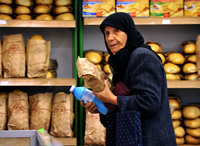Food riots in Russia unlikely despite growing social depression
 The growth of prices on essential foodstuffs in Russia surpasses the growth of personal income in the country. Experts say, though, that Russia is not going to see food riots.
The growth of prices on essential foodstuffs in Russia surpasses the growth of personal income in the country. Experts say, though, that Russia is not going to see food riots.
The workgroup for agriculture and food markets of the Public Chamber of the Russian Federation reported the results of the monitoring of prices on socially relevant foodstuffs (bread, sugar, eggs, milk, curds, butter, beef, pork, poultry, fish and potatoes) in the capitals of Russia's federal regions.
According to the research, the inflation rate on basic foodstuffs made up 30 percent in Russia from May 2010 to May 2011. The situation is most favorable in the city of Stavropol (20 percent of growth), whereas the highest growth of the inflation rate was registered in Khabarovsk and Moscow - 38 and 39 percent respectively. However, the cost of the food basket is the lowest in Moscow - 1,329 rubles ($47). The cost of the food basket in Stavropol was evaluated at 1,436 ($51) and 1,799 rubles ($64) - in Khabarovsk.
Mikhail Popov, the chairman of the workgroup, said that the reason for such strange price differences is the low level of competition on regional markets vs. the market in Moscow. As a result, the prices on foodstuffs in Moscow turned out to be one of the lowest.
According to the report, the cost of the above-mentioned grocery basket in the Russian Federation is 13 percent higher than in the USA, China, Portugal and Spain. At the same time, the level of personal income in Russia is 25 percent lower than the average level in the indicated countries. With the average salary in Russia of 22,000 a month ($785), the control set of food products costs 820 rubles ($29). The same grocery basket in the USA costs $23 (668 rubles) with the average monthly income of $3,500 (99,000 rubles). The cost of the food basket in Portugal and Spain is also cheaper, whereas salaries are higher.
According to researchers, the growth of prices has slowed down in the country during the recent months. "One may say that the peak of the purchasing power of the Russian population has been reached. If prices continue to grow, the Russians will have to alter the consumption structure towards cheaper foodstuffs. They may also choose to consume less of their traditional menu," Mikhail Popov said.
Scientist of politics Mikhail Vinogradov believes that the inflation issue is one of the most painful issues for the general public in Russia nowadays.
"Inflation is a thorn in the side for the majority of Russians. Opposition forces in the country may try to use the growing social depression in the society in their own political interests," he said.
Vitaly Ivanov, another scientist of politics, is certain that one should not expect food riots or any other form of protests in Russia.
"A lot of things have happened in the country, but people do not take to the streets to express their protests. They won't do it now either. Opposition activists may continue their idle talks saying that the people are running out of patience. The people will disappoint them," the expert told Pravda.Ru.
"I believe that protest actions in Russia are not likely to happen. Some actions may take place locally, but they are not going to be connected with the situation in the country n general. They can be related to some certain acute problems that exist in every region," Oksana Goncharenko, an expert with the center for political conjuncture of Russia said.
Officials with the Public Chamber believe that even though the domestic agricultural industry has been showing optimistic results lately, it is obvious that the industry will face serious problems without the support from the state.
Igor Kulagin
Pravda.Ru
Subscribe to Pravda.Ru Telegram channel, Facebook, RSS!




